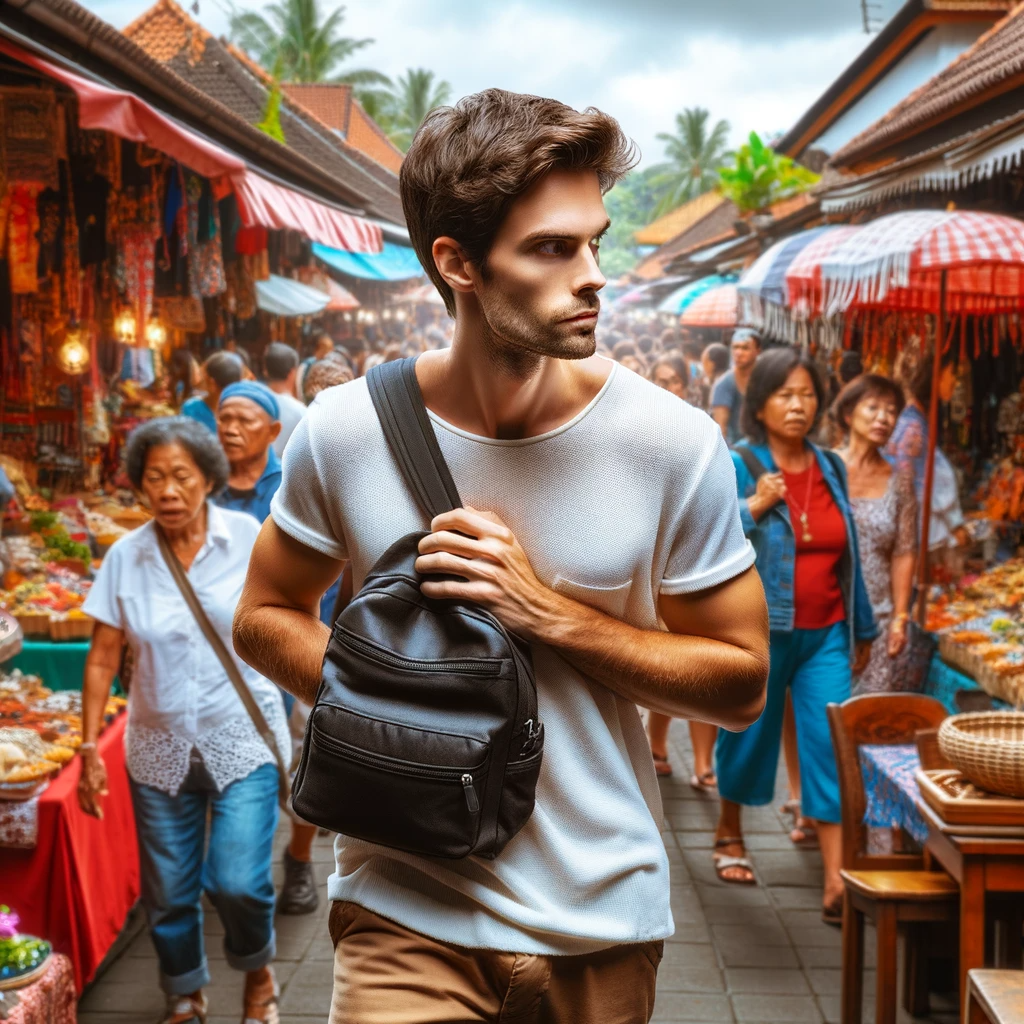Bali, Indonesia is a popular tourist destination in Southeast Asia, famous for its beautiful beaches, lush green landscapes, and unique Hindu culture. However, when visiting a foreign country, safety should always be a top concern. This article provides a comprehensive look at the safety of Bali for tourists.
We will examine risks related to crime, transportation, natural disasters, health issues, and more. Tips are provided for staying safe during your visit. The safest areas in Bali are highlighted along with special considerations for solo travelers, female travelers, and nighttime safety.
By understanding the potential risks and taking proper precautions, you can have an amazing time in Bali while staying safe. Continue reading to learn all you need to know to make informed decisions about traveling to this Indonesian paradise.
Crime in Bali

While Bali is considered relatively safe, tourists should still exercise caution regarding crime. Petty crime and scams targeting tourists are the main issues. Violent crime is rare.
Robbery and Pickpocketing
The most common crimes in Bali are pickpocketing, bag snatching, and theft from hotel rooms. Pickpockets often target crowded tourist sites, markets, buses, and beaches. Bags left unattended, even briefly, are at risk of being snatched.
Robberies can even occur right outside your accommodation when arriving home at night. Criminals on motorbikes occasionally grab bags and phones from unsuspecting tourists.
To avoid theft:
- Carry valuables in front pockets or a concealed money belt.
- Don’t carry more cash than needed for the day.
- Keep bags closed and secured in crowded areas.
- Be alert when riding buses and motorbikes.
- Ask hotels to store valuables in safety deposit boxes.
Drink Spiking and Drug Offenses

There have been some reports of drinks being spiked with drugs in Bali nightclubs and bars. This is done to sedate victims and rob them. It’s best not to leave your drink unattended.
Indonesia has very strict drug laws with harsh penalties. Avoid purchasing or using illegal drugs.
Common Scams and Safety Precautions
Tourists may encounter various scams in Bali:
- Overcharging on taxi rides or tourist attractions. Agree on prices beforehand.
- Sim card and voucher scams. Only purchase from reputable outlets.
- Counterfeit goods sold as authentic. Inspect items closely before purchasing.
- Rigged gambling games. Don’t participate in street gambling.
- Timeshare scams. Be wary of free gifts that require a presentation.
- Credit card skimming. Use ATMs inside banks when possible. Check statements often.
- Corrupt officials seeking bribes. Ask to see identification and report solicitation.
Staying vigilant is key to avoiding theft and scams. Also, consider travel insurance in case of incidents.
Social Interaction and Safety
While meeting locals can be rewarding, caution is advised in certain social situations.
Making Friends Safely
Bali residents are very friendly. It’s common for tourists to be approached and invited to places by locals they just met. This is often done with good intentions. However, be cautious about going off with someone you don’t know well, especially if alone. Arrange to meet in a public place instead.
Risks in Popular Places
Party hot spots like Kuta Beach and Seminyak have high tourist traffic. Busy areas create more opportunities for petty crime and harassment. Travel in groups here, watch belongings closely, and avoid secluded spots.
Safety Tips for Female Travelers
Unfortunately, solo female travelers may draw unwanted attention. Dressing conservatively can help deter harassment. Avoid walking alone at night. Only take registered taxis and avoid accepting rides from strangers. If residing with a local family, consider a lock on your bedroom door.
Transportation Safety

When getting around Bali, take precautions regarding certain transportation options.
Bus, Taxi, and Motorbike Considerations
Local buses often get very crowded, increasing pickpocketing risk. Only take Blue Bird taxis and ensure the meter is used. Negotiate fares beforehand with other taxis.
Motorbike rental is popular despite poor road conditions and high accident rates. Ensure you are licensed and insured to drive one. Wear a helmet at all times.
Recommendations for Safe Travel
To get around safely:
- Travel during daylight hours when possible.
- Keep belongings on your lap on buses.
- Hail taxis yourself rather than accepting rides from solicitors.
- Confirm the taxi has a working meter before getting in.
- Consider hiring a car and driver for convenience.
- Don’t ride motorbikes in heavy traffic or poor weather.
- Take regulated and metered transport from the airport.
- Avoid driving at night when possible. Follow all local driving laws.
Natural Disaster Awareness

Various natural disasters occur in Indonesia that can impact Bali. It’s important to take these into account when planning your visit.
Volcanoes, Earthquakes, Tsunamis, and Flooding
Bali lies along the Pacific Ring of Fire making it prone to seismic activity. Earthquakes happen regularly though most are minor. However, more severe ones can trigger tsunamis.
Bali also has two active volcanoes, Mount Agung and Mount Batur. Volcanic eruptions disrupt air travel and can endanger nearby villages.
The rainy season brings heavy downpours that can cause flooding and landslides. Infrastructure damage often occurs making driving hazardous.
Steps to Prepare
To stay safe:
- Have travel insurance covering volcanic events and earthquakes.
- Check weather forecasts and avoid visiting during monsoons.
- Follow evacuation orders if given.
- Monitor local media for disaster alerts.
- Avoid mountain hiking during volcanic activity.
- Stay away from affected areas until it’s safe to return.
Being aware of natural disaster risks can help you prepare properly for your trip.
Political and Health Risks
A few other safety factors to weigh when visiting Bali include political disturbances and health hazards.
Avoiding Political Events
Protests and civil unrest are not common in Bali, but it’s best to avoid any political gatherings or demonstrations due to the potential for violence. Monitor local news outlets to stay aware of current events.
Stray Dogs and Vaccination Costs
Numerous stray dogs roam Bali streets. While not usually aggressive, they can bite and may carry rabies. Consider the rabies vaccine if staying over a month. Also, research which other vaccinations are recommended.
Other Health Concerns
Contaminated food and water can cause illness like Bali belly. Only drink bottled water and eat fully-cooked food from reputable vendors.
Mosquitoes carrying malaria and dengue fever are present, especially in rural areas. Use repellent and sleep under a net if necessary.
Swimming risks include strong currents, undertows, and boat traffic. Pay attention to any warning signs or flags posted.
Travel Essentials
Certain items and services can help you better handle any incidents during your Bali visit.
Need for Travel Insurance
Comprehensive travel insurance providing medical coverage, emergency evacuation, trip cancellation, and lost baggage reimbursement is highly recommended. This safeguards you if any mishaps occur.
Importance of Photocopies
Carry photocopies of your passport, visa, travel insurance policy, and airline tickets separate from the originals. This aids replacement if they are lost or stolen.
Emergency Contacts
Save local emergency numbers in your phone like the Tourist Police and medical services. Know your country’s embassy location. Have a first aid kit on hand.
Being prepared with the right gear and knowledge helps boost safety.
General Safety Tips
Adhering to these miscellaneous precautions will further protect you during your travels.
Monitoring Local News and Avoiding Tap Water
Stay updated on any current events, protests, weather, or other advisories by following local news. Only drink bottled or filtered water to prevent illness.
Caution in Swimming and Respecting Local Customs
Learn about conditions before swimming at beaches. Avoid alcohol before swimming. Follow all local customs and dress appropriately to avoid offending residents.
Financial Safety and Physical Safety Near Cliffs
Split cash and cards between multiple locations like a money belt or hidden pocket. Don’t display expensive cameras and jewelry. Stay back from cliff edges and use caution on trails.
Other Tips
Additional ways to boost safety include:
- Avoid unmarked taxi and food vendors.
- Don’t trek alone off main trails.
- Be wary of offers that seem too good to be true.
- Keep hotel doors locked.
- Only exchange money at banks or reputable spots.
- Don’t leave drinks unattended.
- Walk away from any disturbances or fights.
- Research cultural etiquette and laws.
- Limit alcohol consumption.
Using sound judgment goes a long way towards staying secure.
Safest Areas in Bali

While no area is completely risk-free, some regions are considered very safe for tourists.
Central Bali (Ubud), Uluwatu, Sanur
Low crime rates have earned Ubud, Uluwatu, and Sanur reputations as safer places to stay. All offer plenty of tourist infrastructure while avoiding notorious party crowds.
Ubud is Bali’s cultural heartland. Its inland location limits ocean risks. Uluwatu hosts the cliffside Pura Luhur Uluwatu temple. Upscale resorts line its beaches.
Sanur is a quieter beach town ideal for families. Its calm shoreline waters also attract snorkelers and divers.
Areas to Exercise Caution
Kuta is the epicenter of Bali’s nightlife and most tourist scams. Nearby Seminyak and Legian are crowded party hubs with elevated petty crime. Candidasa sees periodic surges in crime levels.
Avoid walking alone at night anywhere, including beaches. Take extra care of belongings in busy tourist sites and back alleys.
Special Considerations
Certain travelers should take additional precautions when visiting Bali.
Solo Travel Safety
Those journeying alone face higher risks. Incidents can happen whether male or female. Avoid isolated areas. Don’t walk alone at night or accept rides from strangers. Stay sober and choose accommodations carefully.
Nighttime Safety
Petty crime and harassment peak at night, especially on deserted beaches. Travel via regulated taxis or rented vehicles rather than walking. Avoid poorly lit empty streets. Don’t carry valuables to nightclubs and bars.
Transportation Options
Scooter and motorbike accidents kill many tourists annually. Consider other transport like metered taxis, hired cars, and shuttle buses for safety. Never drive after drinking.
Taking a few extra precautions can help solo travelers, women, and those out at night lower their risk.
Comprehensive Safety Tips
To summarize, here are 15 top tips for staying safe on your Bali vacation:
- Purchase travel insurance covering medical emergencies, theft, and cancellations.
- Avoid carrying large amounts of cash or valuables in public places.
- Keep photocopies of important documents separate from the originals.
- Only take regulated taxis like Blue Bird rather than unmarked ones.
- Don’t accept rides from or go off alone with strangers.
- Monitor your drink at all times at bars and nightclubs.
- Stay alert for pickpockets and bag snatchers in crowded tourist sites.
- Don’t leave bags unattended on the beach or in restaurants.
- Only exchange money at banks or reputable currency kiosks.
- Be cautious when befriended by overly friendly locals.
- Always wear a helmet when renting a scooter or motorbike.
- Check State Department and weather warnings for any alerts about Bali.
- Avoid traveling to higher risk locations like Kuta Beach alone at night.
- Follow all cultural and legal customs to avoid offending locals.
- Only drink bottled water and eat fully cooked food from clean vendors.
Additional Considerations
While Bali is relatively safe, a few final points deserve reiteration.
Avoiding Bad Areas
The Kuta region (including Legian and Seminyak) sees more crime and tourist misbehavior. Avoid these areas at night if possible. Popular temples can also get crowded and prime for pickpockets.
Key Things to Consider
No travel is completely risk-free. But you can better your odds by:
- Traveling in groups when possible.
- Only using regulated transportation.
- Keeping valuables secure and out of sight.
- Researching customs and checking travel advisories.
- Avoiding excess alcohol consumption.
- Monitoring news and weather alerts.
Taking basic precautions greatly improves safety.
Conclusion
While no destination is completely safe, Bali’s risks can be minimized by taking proper precautions. Avoid high crime areas like Kuta, especially at night. Don’t carry excess valuables and be wary of potential scams.
Exercise caution with transportation and follow all cultural customs. Monitor weather and news for any alerts. Purchase travel insurance and make copies of important documents. Travel in groups when possible and avoid isolated areas.
By using sound judgment, the chances of encountering problems are low in Bali. Take the necessary precautions and you can fully immerse yourself in Bali’s amazing culture and natural beauty. Just be prepared and use common sense to ensure your vacation here is trouble-free.

